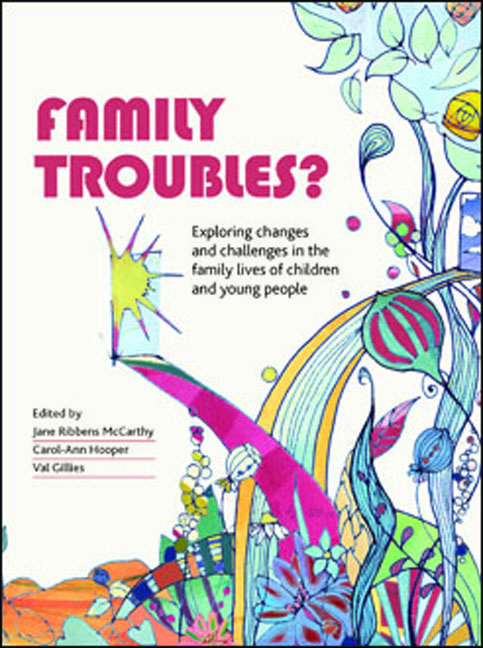Book contents
- Frontmatter
- Contents
- Notes on contributors
- Foreword
- Preface
- 1 Troubling normalities and normal family troubles: diversities, experiences and tensions
- Part One Approaching family troubles ? Contexts and methodologies :Introduction to Part One
- Part Two Whose trouble ? Conteste d definitions and practice: Introduction to Part Two
- Part Three The Normal, The Troubling And The Harmful?: Introduction to Part Three
- Part Four Troubles and transitions across space and culture: Introduction to Part Four
- Part Five Working With Families: Introduction to Part Five
- Index
Part Four - Troubles and transitions across space and culture: Introduction to Part Four
Published online by Cambridge University Press: 07 September 2022
- Frontmatter
- Contents
- Notes on contributors
- Foreword
- Preface
- 1 Troubling normalities and normal family troubles: diversities, experiences and tensions
- Part One Approaching family troubles ? Contexts and methodologies :Introduction to Part One
- Part Two Whose trouble ? Conteste d definitions and practice: Introduction to Part Two
- Part Three The Normal, The Troubling And The Harmful?: Introduction to Part Three
- Part Four Troubles and transitions across space and culture: Introduction to Part Four
- Part Five Working With Families: Introduction to Part Five
- Index
Summary
People have migrated around the globe for centuries, but there are new contexts for such migration in the contemporary world – not least, the advent of telecommunications and air travel, and the rise of women's migration as part of global care chains (Ehrenreich and Hochschild, 2003; Yeates, 2009) – with variable significance for the family lives of children and young people. In Part Four, issues of family change, transitions and troubles (including ill-health) across different global spaces and cultures are centralised, with chapters focusing on peoples from developing worlds, or the global South (including Africa, the Indian subcontinent and South America), as well as migrants on the edges of Europeanness. Issues of material resources and global inequalities loom large, but there is also evidence of a form of cultural inequality, through which Western understandings and discourses of childhood and family life may become dominant, almost hegemonic, through their incorporation into international legislation and the work of aid agencies (Boyden, 1997; Holzscheiter, 2010). These chapters demonstrate how some of these broad issues are manifest in the troubles of particular young people's family lives, in particular contexts, across space and culture. All the chapters bring young people's own perspectives into view, whether explicitly or implicitly – as in the discussion of forced marriage, which, by definition, entails resistance to an actual or proposed marriage.
Umut Erel's focus is on the experiences of Kurdish and Turkish migrants to London, drawing on the concept of ‘generation work’ to highlight the creation of a ‘third space’ between different generations of migrant family members, with young people actively negotiating and managing such processes. In this space, language is key, not just as a means of communication, but also as a symbol and metaphor for cultural differences, imbued with varied emotions. Rather than framing these young people's experiences through the widely used notion of ‘cultural conflict’, Erel draws out the complexity of their migration experiences and positioning, which cannot easily be categorised as troubled or not.
Across the world in South America, Maria Claudia Duque-Páramo explores the varied experiences of families in which children remain in the country of origin – in this case, Colombia – while one or more of their parents move abroad for work.
- Type
- Chapter
- Information
- Family Troubles?Exploring Changes and Challenges in the Family Lives of Children and Young People, pp. 195 - 198Publisher: Bristol University PressPrint publication year: 2013



